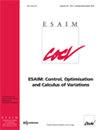Local null controllability of a quasi-linear system and related numerical experiments
IF 1.2
3区 数学
Q4 AUTOMATION & CONTROL SYSTEMS
Esaim-Control Optimisation and Calculus of Variations
Pub Date : 2023-01-23
DOI:10.1051/cocv/2023009
引用次数: 1
Abstract
This paper concerns the null control of quasi-linear parabolic systems where the diffusion coefficient depends on the gradient of the state variable. In our main theoretical result, with some assumptions on the regularity and growth of the diffusion coefficient and regular initial data, we prove that local null controllability holds. To this purpose, we consider the null controllability problem for the linearized system, we deduce new estimates on the control and the state and, then, we apply a Local Inversion Theorem. We also formulate an iterative algorithm of the quasi-Newton kind for the computation of a null control and an associated state. We apply this method to some numerical approximations of the problem and illustrate the results with several experiments.拟线性系统的局部零可控性及相关数值实验
研究扩散系数依赖于状态变量梯度的拟线性抛物型系统的零控制问题。在我们的主要理论结果中,通过对扩散系数的正则性和增长以及正则初始数据的一些假设,证明了局部零可控性成立。为此,我们考虑了线性化系统的零可控性问题,我们推导了新的控制估计和状态估计,然后应用了局部反演定理。对于零控制和相关状态的计算,给出了拟牛顿类迭代算法。我们将此方法应用于该问题的一些数值近似,并通过几个实验来说明结果。
本文章由计算机程序翻译,如有差异,请以英文原文为准。
求助全文
约1分钟内获得全文
求助全文
来源期刊

Esaim-Control Optimisation and Calculus of Variations
Mathematics-Computational Mathematics
自引率
7.10%
发文量
77
期刊介绍:
ESAIM: COCV strives to publish rapidly and efficiently papers and surveys in the areas of Control, Optimisation and Calculus of Variations.
Articles may be theoretical, computational, or both, and they will cover contemporary subjects with impact in forefront technology, biosciences, materials science, computer vision, continuum physics, decision sciences and other allied disciplines.
Targeted topics include:
in control: modeling, controllability, optimal control, stabilization, control design, hybrid control, robustness analysis, numerical and computational methods for control, stochastic or deterministic, continuous or discrete control systems, finite-dimensional or infinite-dimensional control systems, geometric control, quantum control, game theory;
in optimisation: mathematical programming, large scale systems, stochastic optimisation, combinatorial optimisation, shape optimisation, convex or nonsmooth optimisation, inverse problems, interior point methods, duality methods, numerical methods, convergence and complexity, global optimisation, optimisation and dynamical systems, optimal transport, machine learning, image or signal analysis;
in calculus of variations: variational methods for differential equations and Hamiltonian systems, variational inequalities; semicontinuity and convergence, existence and regularity of minimizers and critical points of functionals, relaxation; geometric problems and the use and development of geometric measure theory tools; problems involving randomness; viscosity solutions; numerical methods; homogenization, multiscale and singular perturbation problems.
 求助内容:
求助内容: 应助结果提醒方式:
应助结果提醒方式:


